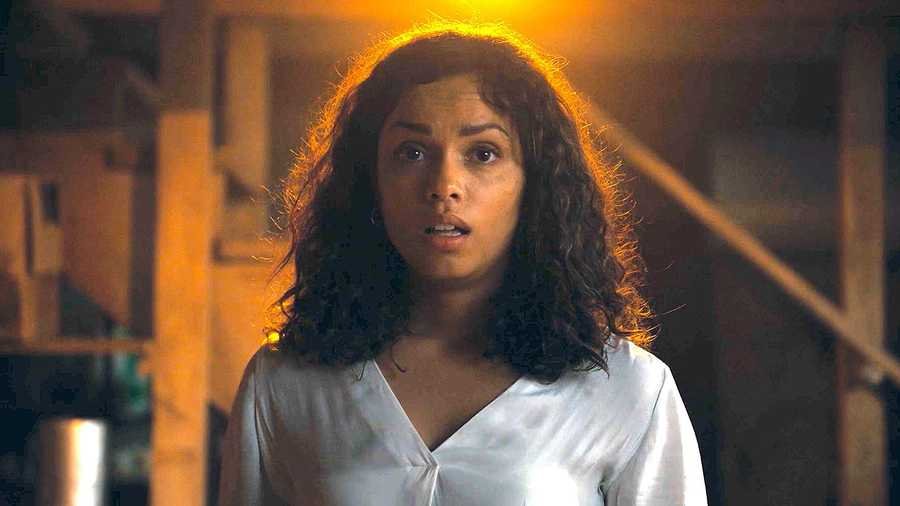Barbarian (2022) Film Review and Summary
SOFT 8/10
Apparently the rhetoric disseminated by masses of parents and guardians of “stranger danger” is not compelling enough for someone like Tess (Georgina Campbell) to refrain from staying the night with the mysterious Keith (Bill Skarsgård). Barbarian (2022) sees Tess seeking out a place to stay at an Airbnb in Detroit, Michigan in order to be readily available for her imminent job interview. Keith, who booked a night at the same home on a different app, needs a makeshift living situation while he searches for a new permanent residence. This double-booking is every Zoomer and Millenial’s greatest fear during a stay away from home, but the two bond over their similar misfortune. Even though at first glance, the house is wholly uninviting with the film’s opening shot consuming it within an impenetrable darkness, the two agree to become temporary roommates.
This entire initial scenario is obviously a product of the time we currently live in, which is how the film so effectively preys on a combination of technological fear-mongering and the unknown. Keith certainly fits the bill as an enigma; he presents himself as lethargic, while his eyes are like gaping craters that accentuate the anxiety-inducing verbal barfing that he can’t seem to restrict himself from committing out of nervousness. The house seems humble from the outside, but the film’s camerawork makes it seem grand and endless. Stationary shots showcase the entire main room of the house simply by panning the camera, or by employing dolly movements that are reminiscent of point-and-click video games that require you to discover new locations by moving through a mysterious vicinity. Keith’s eagerness to not allow Tess to stay somewhere else seems suspicious at first, but the primary inquisition derives from the film’s sound design that is overbearing with sounds of harmonized screaming that only seems to be audible to Tess.
Barbarian introduces itself as a proud homage to every horror genre cliche under the sun; doors that close behind people without any reason, outsiders warning the protagonist of potential danger, as well as a focus on the fact that Tess locks the door every time she enters a room. These tropes are fully acknowledged by Tess but are consistently deliberately neglected out of natural curiosity. Just as the house seems to distort itself every time Tess moves into another room, the neighborhood that the residence inhabits is surprisingly dilapidated once the daylight is able to reveal its true essence. As Tess continues to explore the Airbnb, she discovers a series of hidden locations within the house’s basement. One of such rooms could be practically ripped from James Wan’s first edition of Saw (2004); it’s an empty area that consists of a stained mattress, a bloody handprint on a wall and a grotesque bucket full of one’s darkest fears. Hats off to Zach Kuperstein, the cinematographer who does an amazing job at conforming the film’s camerawork to the action unfolding by implementing a hand-held style during playful scenes, stepping in front of Tess to emphasize claustrophobic ones, among other appropriate instances.
After witnessing one of the more horrifying moments in the film, there’s a drastic tonal shift to Hollywood director AJ (Justin Long) passionately singing along to the radio as he drives in his sports car around Hollywood. During this gleeful moment of bliss, AJ receives a damning call from associates that inform him of pending rape charges that are sure to ruin his career, as he is certainly guilty of the crime. This brings AJ to a house he owns in Detroit in order to cough up more funds for legal defense, the same home that Keith and Tess have fallen victim to. AJ is a poignant caricature of the deviously powerful figureheads that succumbed to the #MeToo movement of the past years. AJ is not someone to root for and you can’t help but laugh at the ridiculous ways that he submits to his newfound fate of the same home that engulfed the previous duo. The title of the film is likely an allusion to the toxic masculinity exhibited in the film; Keith is a subtly generous man who asserts that he knows what’s best for a woman like Tess, while AJ’s exemplification goes without restating.
The final act is just as freshly terrifying as the two acts that lead up to it are perfectly cliche. There is clear commentary about the hidden terrors of suburbia with the additional context Barbarian provides us in its conclusive finale. The surrounding destitution begins to seem more appealing to Tess than the once-cozy vacation spot. My previous allusion to James Wan seems ever present in Barbarian’s culminating climax, as the film transitions from excessively indulging in cinematic tropes to depicting an absolute affinity for campy absurdity. Barbarian might not be as creepy or scary as general horror fans may desire from a film of its nature, but it is surely an originally entertaining addition to the genre.


